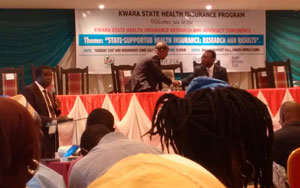On hand to represent was the Executive Secretary, Dr Itunu Akinware. The conference examined topics which gave an overview of the Kwara State health insurance program, the impact of the program, costing and impact of healthcare interventions for chronic diseases and a final session on ‘Why do People Enrol in Health Insurance’. Going forward, the HFN is poised to continue its advocacy for universal health coverage and how the lessons from the Kwara example can be of use in building a viable universal health coverage system.
HFN PARTICIPATES IN KWARA STATE HEALTH INSURANCE RESEARCH AND ADVOCACY DAY
 The HFN, in line with its cardinal goals of a better private healthcare sector, currently participated in the Kwara State Health Insurance Research and Advocacy Day in the ancient capital, Ilorin. The objective is to gather experts from the private sector, academia, government, non-government organizations and donors as well as local communities to discuss and research the lessons learned from the Kwara State Health Insurance Program and the implications for delivery of quality healthcare in Nigeria.
The HFN, in line with its cardinal goals of a better private healthcare sector, currently participated in the Kwara State Health Insurance Research and Advocacy Day in the ancient capital, Ilorin. The objective is to gather experts from the private sector, academia, government, non-government organizations and donors as well as local communities to discuss and research the lessons learned from the Kwara State Health Insurance Program and the implications for delivery of quality healthcare in Nigeria.
The Kwara State Health Insurance is a public-private partnership between the Government of Kwara State, Hygeia HMO, Health Insurance Fund, and the PharmAccess. As a result, the UN Secretary-General Mr Ban Ki-Moon has described it as groundbreaking and innovative. In 2014, the initiative was recognized by the OECD Development Assistance Committee for Taking Development Innovation to Scale. One unique feature of the Program is its research component to continuously measure its impact, the cost-effectiveness of maternal health care and other important attributes of the program. This has resulted in more than 50 peer-reviewed publications.
Latest from
- Disease ‘worse than Ebola’ kills 5,000 in DR Congo – WHO
- Stronger donor, govt partnership will help Nigeria achieve UHC by 2030 – Minister
- Gestational Diabetes, threat to maternal, child health
- Number of persons with mental illness increasing – Doctors
- HIV: Nigeria needs to combat transmission among sex workers, gays, other vulnerable groups – UNAIDS






